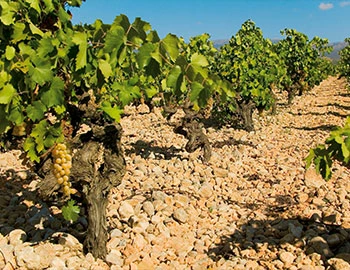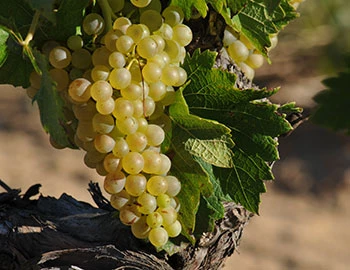
Vi de Vila Porrera blanc 2019
DOC Priorat, Cims de Porrera, 750 ml

| Grape variety: | Garnacha, Picpoul, Pedro Ximénez, Macabeo |
| Producer: | Cims de Porrera |
| Origin: | Spain / Catalunya / Priorato |
| Other vintages: |
Description
Out of the ordinary, this wine is demanding for the palate, particularly at young age. We advise to decant it in order for the aromas of ripe pear and of quince to really come out. The great aromatic complexity of the bouquet (bergamot, mint, almond paste, lime blossom and honey) persists in the palate enhanced by Sherry notes. The clear structure with its bitter minerality emphasis, the full bodied expression on the palate and the long finish all indicate a wine with a great aging potential.
Attributes
| Origin: | Spain / Catalunya / Priorato |
| Grape variety: | Garnacha, Picpoul, Pedro Ximénez, Macabeo |
| Ripening potential: | 1 to 7 years |
| Drinking temperature: | 10 to 12 °C |
| Vinification: | fully destemmed, fermentation with grapes' own yeast, fermentation in wooden barrel, fermentation in cement tank |
| Harvest: | hand-picking, in small boxes, strict selection |
| Maturation: | in cement tank, bâtonnage, in demijohns |
| Maturation duration: | 8 months |
| Volume: | 15.0 % |
| Note: | Contains sulphites |
Pedro Ximénez
Liquid raisins
If you saw the white grapes, you would not suspect it, but white wines from Pedro Ximénez taste like liquid raisins. This variety is a genuine Andalusian. It has been known since the 17th century, and was probably named after a winery called Pedro Ximénez – the name is as common in southern Spain as Jones or Smith is to us. Its stronghold is in the Montilla-Moriles cultivation area. There, the sugar-rich grapes are traditionally dried on mats of esparto grass. Thus they lose their moisture, and the sugar concentration rises. Experts simply refer to the resulting sweet, nutty, coffee- and cocoa-spiced elixirs as PX. There is also a PX version of sherry. Nonetheless, most sherry houses do not grow the Pedro Ximénez themselves, but purchase them in Montilla-Moriles. One also seldom encounters the Pedro Ximénez as a dry white wine. Yet it does not present a great deal of profile.
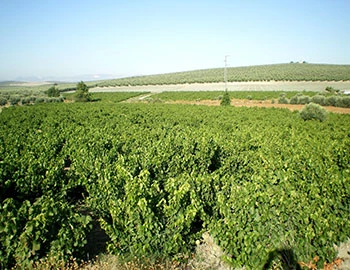
Picpoul
Garnacha
Grenache seldom comes alone
Spaniards and Sardinians make the Grenache contentious: both claim it originated from their country. In fact, it had already appeared in both places by the 16th century. But a large number of mutations in Spain indicates that it has deeper roots on the Iberian Peninsula. The Grenache is meaty, rich in tannins and spicy, with a wonderful, fruity sweetness and rich aromas of blackberry, cassis, plums and pepper. Under the name Garnacha, it contributes fullness to the Rioja. In Sardinia it is called Cannonau, where it yields strong, expressive wines. But its stronghold is in France. Grenache is the star in Châteauneuf-du-Pape and streams into many other assemblages from the south. Its preferred partners are Syrah and Mourvèdre. This blend is also very popular abroad. In Australia, these wines are simply called "GSM".

Macabeo
For fruity cava and white Rioja
Still or sparkling: the Macabeo can do both. In its native Catalonia, it forms, with Parellada and Xarello, the triumvirate of cava grapes. It gives the sparkling wine its fresh apple fruit; the Parellada provides elegance, and the Xarello contributes body and fullness. Pressed as a still white wine, the Macabeo smells of apple, pear, flowers and herbs. A light almond note often comes as well. This can be tasted in the classic white wines from Rioja: they are made from this variety, which there is called Viura. The Macabeo – also spelled Macabeu – migrated from northern Spain across the border into French Roussillon.
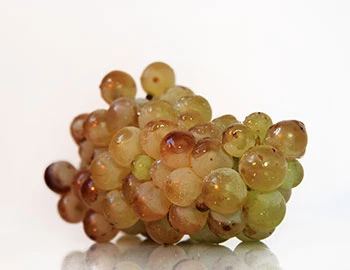
Priorato
Priorat: Vergessen, wiederentdeckt, gefeiert…
Noch anfangs der 80er Jahre war das Priorat eine durch die Abwanderung geschwächte Problemregion. Dann entdeckten vier junge Winzer den verlassenen Talkessel, der nur eine Autostunde von der katalonischen Mittelmeerküste entfernt liegt, und begannen mit der Restauration der alten Rebanlagen. Heute sind die Priorat-Weine, die meistens von den alteingesessenen Sorten Garnacha und Cariñena geprägt werden, weltweit gefragt. Dank der spektakulären Renaissance der Priorat-Weine erlebt die ganze Region einen Aufschwung.
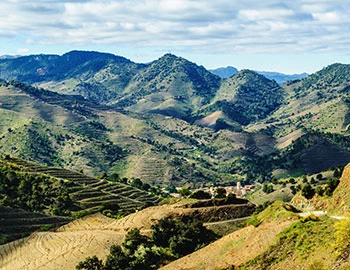
Spain
Spain – Variety and perfection
“Somewhere in la Mancha, in a place whose name I do not care to remember...,” begins Don Quixote's odyssey.
The most famous part is definitely when Don Quixote thinks windmills are his enemy and wants to fight them – until they nearly kill him. It’s possible there was a bit too much of the La Mancha wine at play. Spanish vines fight for their survival in rugged landscapes, battling fierce drought and rough soils. But they fight well.
